Internet Telephony
Internet Telephony Software for Business
Welcome the future of communication with Internet Telephony Software. Say goodbye to traditional phone lines and embrace a cost-effective solution that enables crystal-clear voice and video calls over the internet with unparalleled convenience, flexibility, and scalability.

Get USA Virtual Phone Number Online
Trusted and loved by 5500+ companies worldwide













































How to set up an Internet Telephony?
To set up an Internet Telephony, create a KrispCall Account, and select the country and phone number type. Make the payment, configure the settings and features, and you are set to use the internet telephony to make calls.

Buy 100+ Country’s International VoIP Phone Number Online
Get connected globally with Krispcall’s International VoIP Phone Numbers! Buy 100+ country numbers online and stay connected effortlessly. Expand your reach, enhance business communications, and enjoy seamless international connectivity. Join Krispcall today and experience the power of global communication at your fingertips.
KrispCall Internet Telephony Features
Unlock awesome features in your custom local phone number to upgrade your business communication.
Internet Telephony with Your Favorite Tools Integration
Easily integrate internet telephony with your favorite tools with Krispcall. Streamline your communication process with internet phone numbers integrated with popular applications.









Testimonial
Call Center Managers' Experiences with KrispCall
Many of our customers have local telephone number from KrispCall. To find out why, these were the recurring themes.
A Quick Guide About Internet Telephony
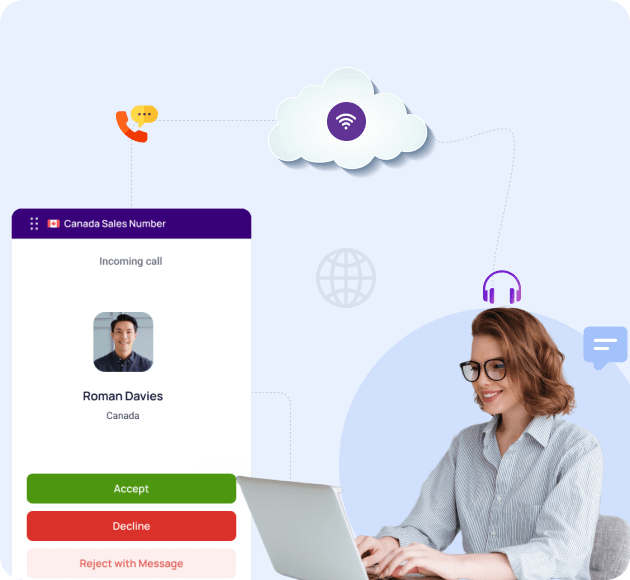
What is Internet Telephony?
What are the advantages and disadvantages
of Internet Telephony?
Advantages
Disadvantages
How does Internet Telephony Work?
Here is a step-by-step process on how Internet Telephony works.


How To Choose The Best Internet Telephony Software?
Top 10 Internet Telephony Service Providers in 2024
1. KrispCall
KrispCall is a leading Internet Telephony with advanced features like a unified callbox, Interactive voice response, and call monitoring. Over 2000 companies trust Krispcall in over 100 countries. Krispcall offers many features, making it ideal for personal and business use.
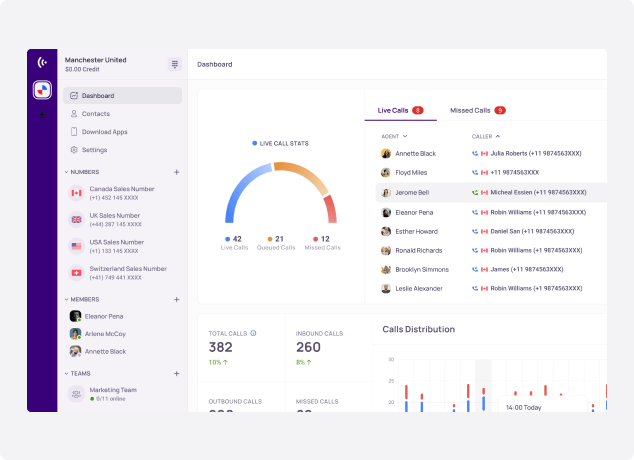
Krispcall offers flexibility, scalability, and great user experience at a competitive price. Moreover, this internet telephony offers the best contact center software for managing customer relationships and providing personalized support.
KrispCall offers local virtual, international, vanity phone, and toll-free numbers. Here are some prominent features that make Krispcall the best option for cloud telephony.
Feature
Pricing
Pros
Cons
2. RingCentral
RingCentral is a prominent Internet telephony service provider offering many advanced features, including Interactive Voice Response and Automatic Call Distribution. RingCentral is known for its simple setup and use.
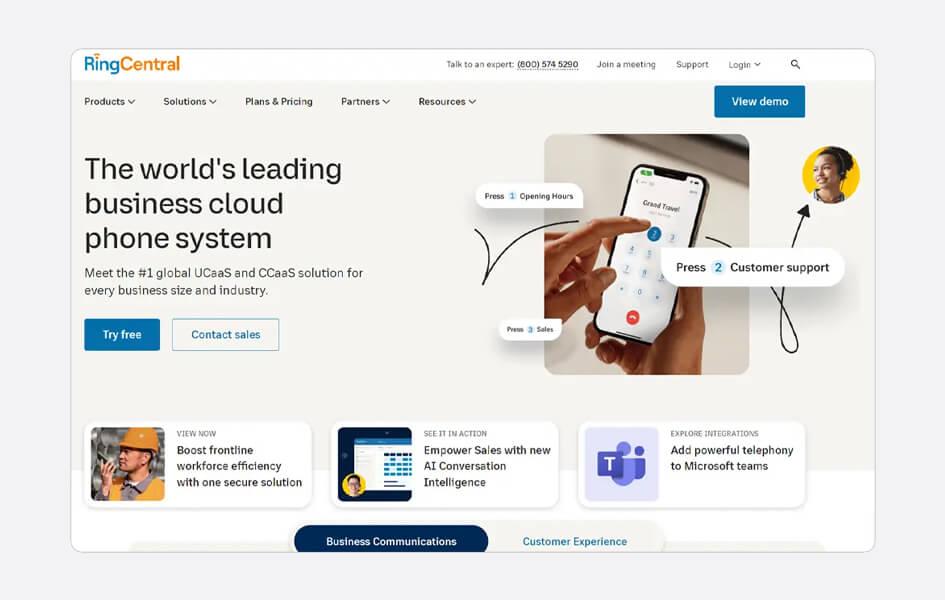
RingCentral has been one of the most popular providers for businesses that need flexibility, as it offers compatibility for on-premises, remote, and hybrid communication, and interaction. It offers service at a reasonable price for various phone numbers, including local, international, and vanity phone numbers.
Here are some of the major features of RingCentral
Feature
Pricing
Pros
Cons
3. Nextiva
Nextiva is a prominent provider of cloud-based communication solutions designed to empower businesses. Nextiva enables businesses to streamline communication processes, improve productivity, and enhance customer interactions.
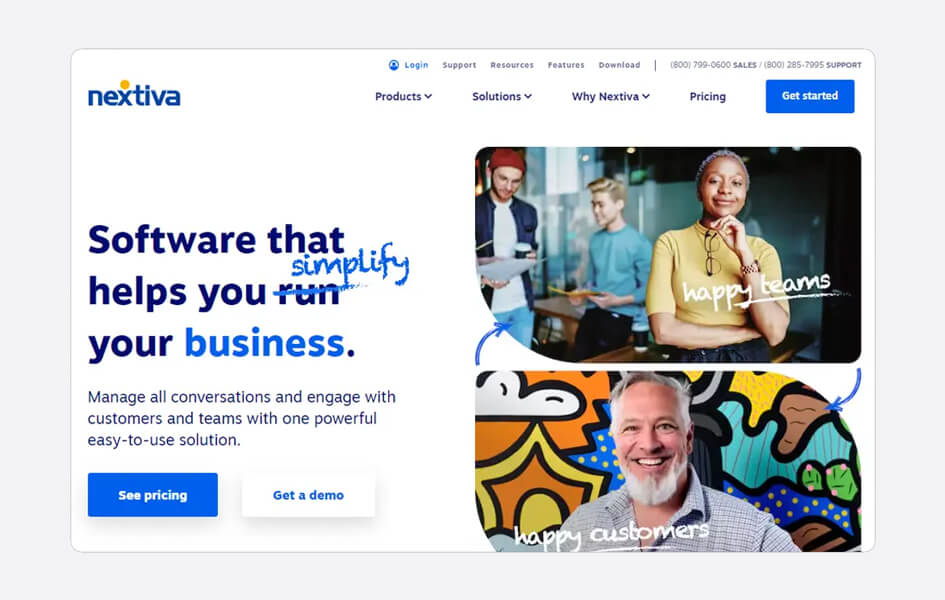
With advanced features such as auto-attendant, call recording, voicemail-to-email, and mobile integration, Nextiva provides a user-friendly solution for businesses of all sizes. Nextiva’s commitment to exceptional customer support and innovative technology has made it a trusted choice for businesses seeking reliable and scalable communication solutions.
Feature
Pricing
Pros
Cons
4. Vonage
Vonage has become a popular provider of internet telephony and cloud communications services for businesses of all kinds and sizes. Their platform has several communication options, including voice calling, video conferencing, texting, and contact center services.

Businesses may improve their communication skills with Vonage by leveraging innovative technologies like call routing, virtual numbers, voicemail transcription, and CRM connections.
Vonage is renowned for its dependable network, international reach, and adaptable plans, making it a reliable option for companies trying to optimize their communication systems and raise customer satisfaction.
Feature
Pricing
Pros
Cons
5. Ooma
Ooma is one of the most reputable providers of internet telephony services for companies. Their platform provides various communication options, such as voicemail transcription, virtual phone numbers, and sophisticated call management tools.

Businesses can use Ooma’s internet-based calling services at a low cost to ensure high-quality voice communication without using traditional phone lines. Ooma is a well-liked option for small and medium-sized organizations seeking a reliable phone solution that provides flexibility and scalability because of its user-friendly interface, dependable service, and reasonable pricing.
Feature
Pricing
Pros
Cons
6. 8×8
8×8 is another prominent virtual phone number provider. Their platform provides various services, including team messaging, video conferencing, internet telephony, and contact center solutions. 8×8 allows seamless communication and collaboration across teams with features including virtual numbers, call routing, voicemail transcription, and interfaces.

8×8 is a reputable option for businesses wishing to optimize their communication infrastructure and boost productivity because of its dependable network, strong security measures, and scalable solutions.
Feature
Pricing
Pros
Cons
7. Grasshopper
Grasshopper is a prominent provider of virtual phone number services focused on small and medium-sized businesses. They provide various tools and capabilities on their platform, such as call forwarding, voicemail transcription, and a mobile app for handling calls to simplify communication.

Grasshopper offers virtual phone numbers that can be used with existing devices, enabling businesses to build a professional presence. Moreover, Grasshopper is a well-liked option for small firms looking for a reliable and adaptable virtual number solution to improve their communication capabilities because of its user-friendly interface and useful features.
Feature
Pricing
Pros
Cons
8. Dialpad
Dialpad is emerging as one of the best virtual phone number providers. With features including voice calling, video conferencing, texting, and contact center capabilities, the Dialpad platform provides a contemporary approach to internet telephony.
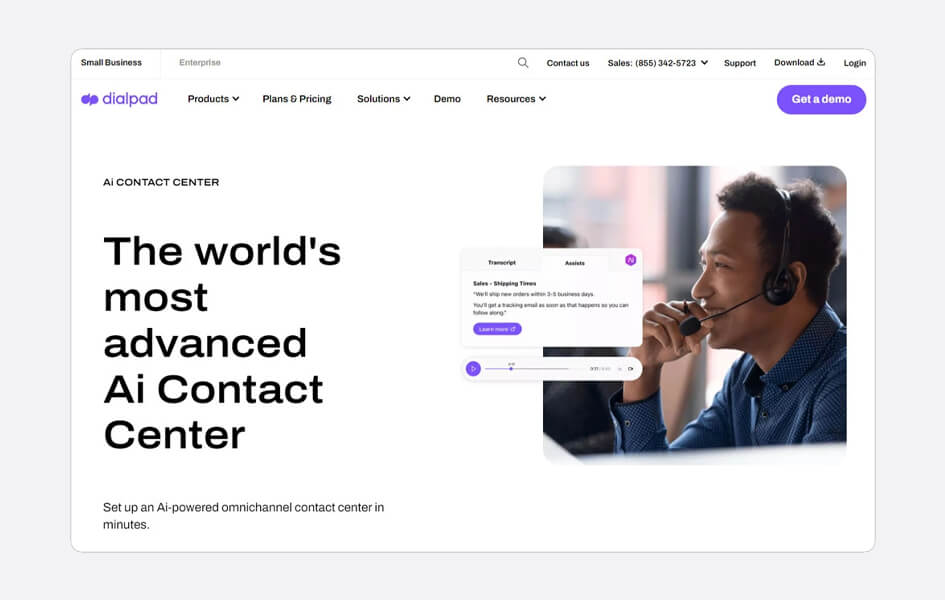
Dialpad’s user-friendly interface and easy connections with well-known business applications enable productive communication and teamwork. Dialpad lets organizations increase efficiency and improve customer interactions with the help of cutting-edge capabilities like real-time transcription and speech intelligence driven by AI.
Feature
Pricing
Pros
Cons
9. MightyCall
MightyCall is another well-known provider of virtual phone numbers. Their platform offers various services, including custom greeting, auto attendant, call waiting, call screening, contact center solutions, team messaging, video conferencing, 24/7 auto-attendant and powerful integration.
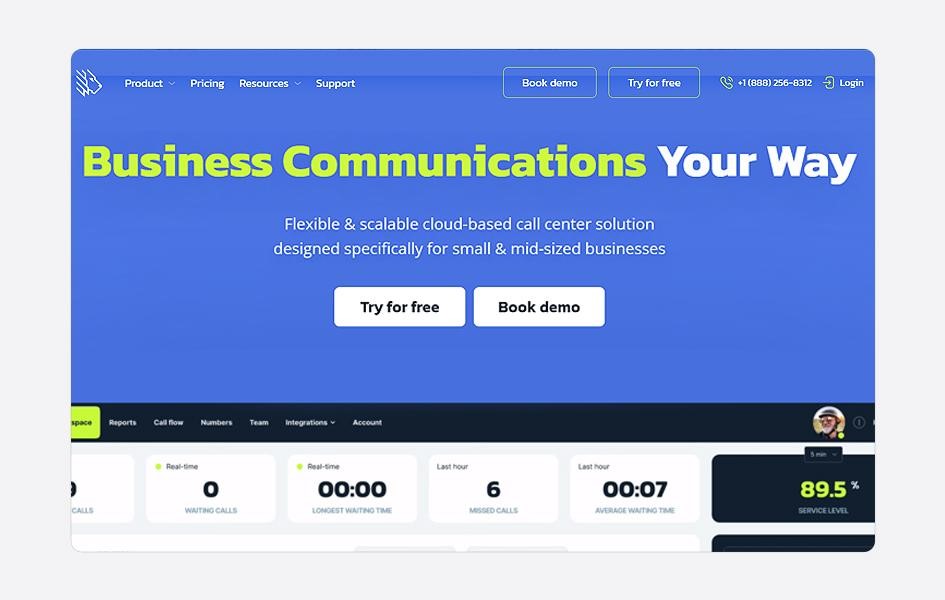
The capabilities like virtual numbers, call routing, voicemail transcription, and interfaces,makes it a better option for entrepreneurs and small enterprises looking for a reliable communication platform. Due to its trustworthy network, and robust security measures business can use internet-based calling services at a low cost communication without using traditional phone lines.
Feature
Pricing
Pros
Cons
10. Google Voice
Google Voice has a variety of features available to improve communication for both personal and professional use. Users of Google Voice can get a virtual number through the service to connect to their current mobile or landline phone.
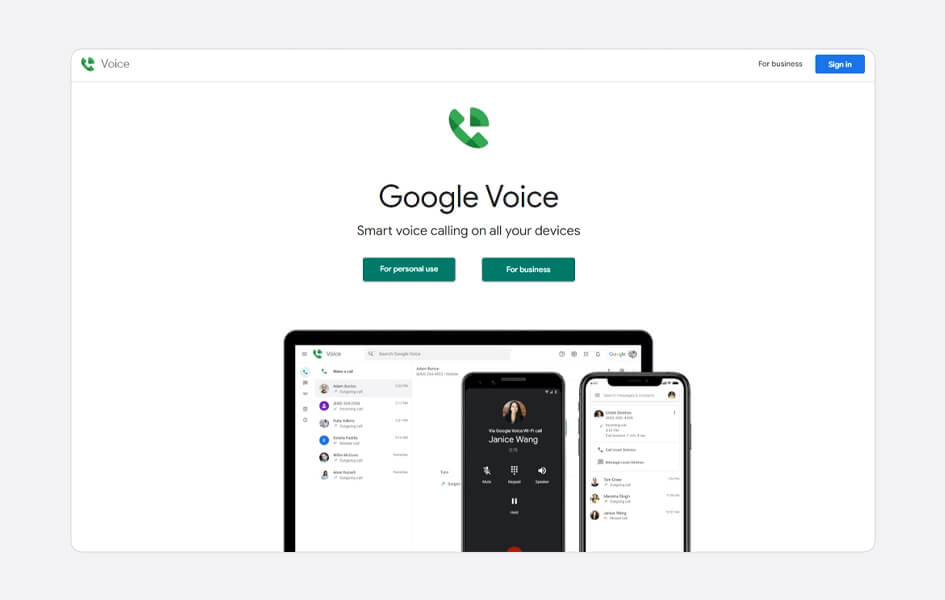
Additionally, Google Voice connects with other Google services, making it possible to synchronize contacts and call history without any hassle. Google Voice is a popular option for people and small organizations looking for a virtual phone number solution due to its user-friendly interface, affordability, and integration features.
Feature
Pricing
Pros
Cons
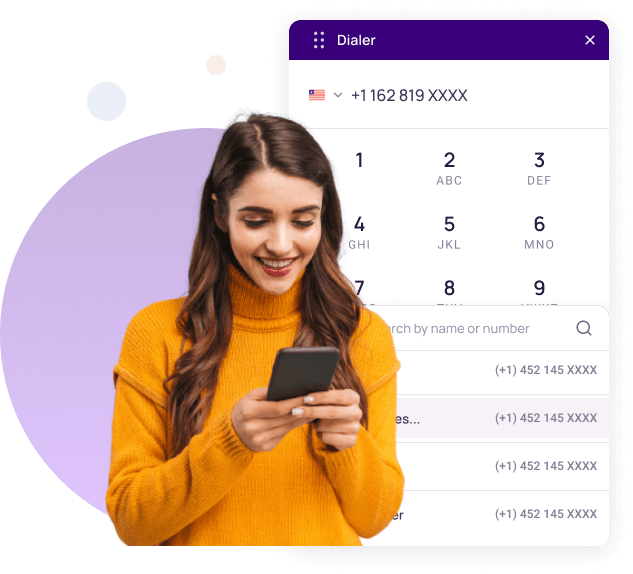
What is the best virtual number for business?
Several options are available when choosing the best virtual number for any business. A good virtual number can improve customer communication and enhance a company’s professional image.
A few of the best virtual number services are known for their reliability, features, and suitability for businesses. Here are the various providers that align with most business needs, with the features like call forwarding, voicemail transcription, or integration capabilities.
Mistakes to Avoid when Buying a Business Phone Number
There are many common mistakes that individuals and businesses make while buying a business phone number from various service providers. Here are some major mistakes to be considered when buying a business phone number:
Frequently Asked Questions
Didn’t find the Answer you were looking for? Visit our Help Center or Contact Support
Internet telephony software is those softwares that facilitates voice communication over the Internet. The analog audio streams are transformed into digital data packets and sent across IP networks. The software replaces the need for conventional phone lines by enabling users to make voice conversations, hold video conferences, and send multimedia messages.
Internet Telephony comes with numerous advantages. However, there are some disadvantages, like reliability and call quality issues, dependence on a stable internet connection, limited accuracy of location information in emergency calls, power dependency during outages, security risks, compatibility, and interoperability challenges.
Internet telephony transforms analog voice signals into digital data packets and sends them via IP networks. The process involves voice conversion, packetization, transmission over IP networks, routing, reassembly, and voice conversion at the receiving end.
Internet telephony has many applications like business communication, call centers, international calling, remote work, telecommunications, teleconferencing, webinars, and VoIP service providers.
Internet telephony has a number of advantages, including cost efficiency, flexibility, integration of advanced features, scalability, better quality, and reliability.
Voice over IP (VoIP), commonly called IP telephony or IP telephony, is a technology that enables voice communication over the Internet utilizing the Internet Protocol (IP). It involves the conversion of analog voice signals into digital packets that are transmitted over an IP network.
Internet Telephony refers to transmitting voice and multimedia communication over the Internet using protocols such as Voice over Internet Protocol (VoIP). It relies on the public internet as the network infrastructure for transmitting voice data.
On the other hand, IP telephony relates especially to the transmission of voice communication through Internet Protocol (IP) networks. It includes local area networks (LANs) and wide area networks (WANs). Voice communication with IP telephony can occur across a vast area network or a private network, such as one connecting many offices.








































































